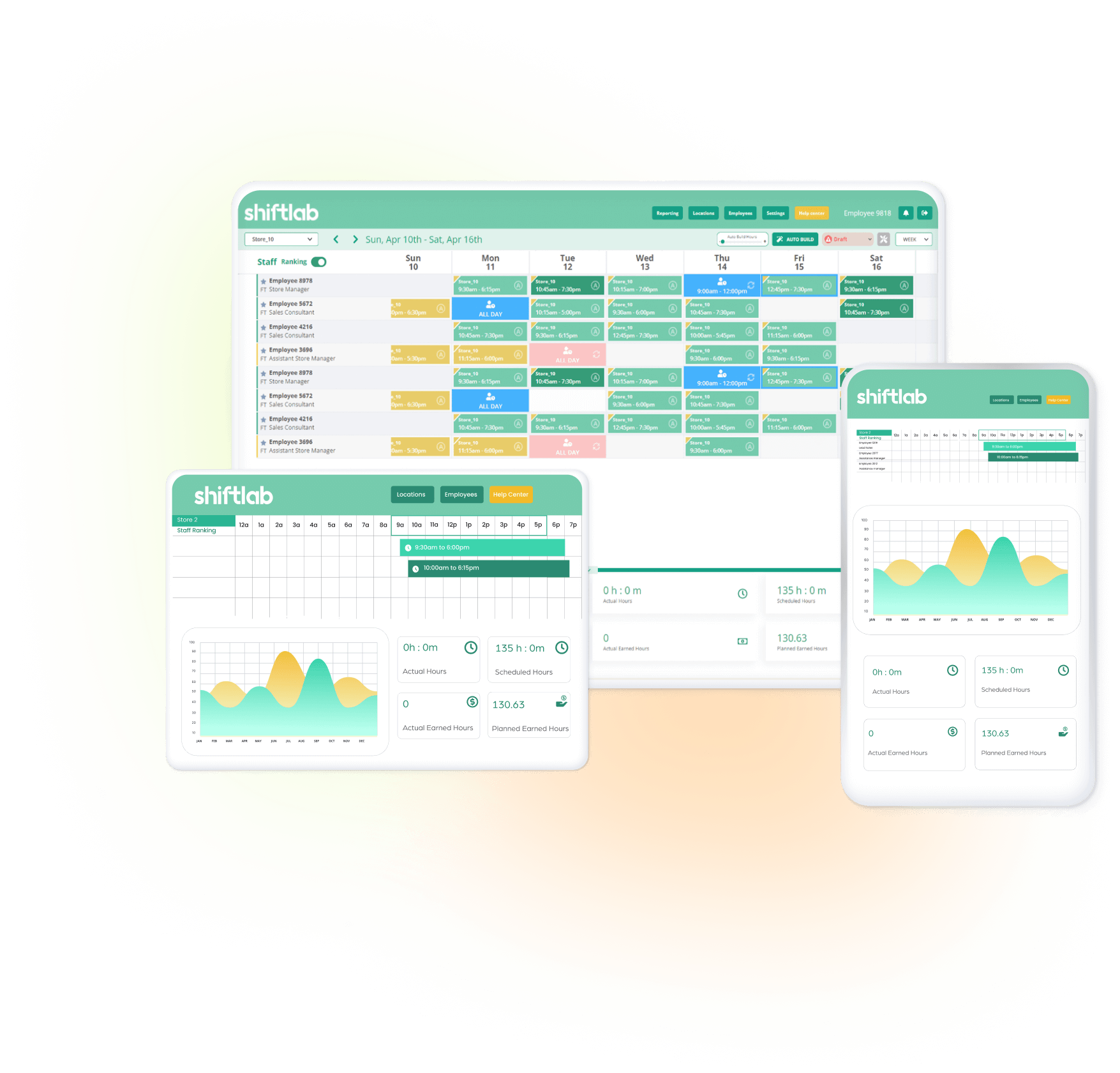
Retail Performance Management
Strategies and Best Practices for Retail Success

If you’re a leader or manager of a retail organization, you already know that optimizing store and staff performance is critical for success, especially in today’s competitive landscape. Retail performance management is a strategic approach that enables retail businesses to align their processes and tactics with business goals, monitor progress, and continuously improve retail operations.
By effectively managing performance, retailers can enhance efficiency, reduce costs, and deliver exceptional customer experiences - ultimately driving profitability and growth.
What is Retail Performance Management?
Retail performance management is an ongoing process that involves setting clear objectives, defining key performance indicators (KPIs), monitoring progress, and implementing strategies to improve retail business performance.
Its primary goals are to maximize operational efficiency, boost employee productivity, and deliver superior customer service.
At its core, retail performance management aims to establish a culture of continuous improvement. All aspects of the business are regularly evaluated and data-driven decisions are made to optimize processes, streamline operations, and drive better results.
Retail Performance Management Strategy
Developing an effective retail performance management strategy is essential for achieving long-term success. Here are a few key considerations:
Align performance goals with overall business objectives and values
Ensure that performance targets and metrics align with the company's overarching mission, vision, and values. This alignment creates a cohesive, focused approach to performance management - and prevents your team from spending time on goals that don’t matter.
Develop a clear performance management framework and communication strategy
Set up a well-defined framework that outlines performance expectations, performance measurement criteria, and communication channels. Transparent communication ensures that all stakeholders understand their roles and can easily share feedback with the right people.
Establish accountability and ownership for performance outcomes across the organization
Clearly define roles and responsibilities for performance management at all levels, from top leadership and management to frontline staff. This fosters a sense of ownership and accountability, encouraging everyone to take an active role in achieving performance goals.
Setting up rewards or incentives for team members who hit targets can also help increase motivation and ownership. Especially for your frontline staff, it’s important to communicate the “why” behind your performance goals and how it benefits them individually in addition to the overall company.
Emphasize continuous improvement and adaptation as key components of strategic planning
Recognize that performance management is an ongoing process that requires regular evaluation and adaptation. Encourage a culture of continuous learning and improvement - where successes are celebrated and challenges are addressed proactively and constructively.
Monitoring and Analyzing Performance Data
Effective performance management in retail relies on accurate and timely data collection and analysis. It’s essential to have a solid understanding of retail key performance indicators (KPIs) and performance metrics.
Here are some retail performance KPIs that retail organizations commonly track:
- Year-over-year sales
- Monthly gross profit per store
- Average transaction value
- Sales per employee
- Traffic (for both physical retail stores and online)
- Customer satisfaction score
Improving Employee Performance
Engaged and well-trained employees are essential for delivering exceptional customer experiences and driving business success. Here are some strategies for improving employee performance:
Implement effective training programs tailored to employee roles and responsibilities
Provide training programs that equip employees with the knowledge and skills they need to excel in their roles. Tailor training to specific job functions and responsibilities for maximum effectiveness.
Provide regular feedback and recognition for performance improvement
Establish a culture of open communication and feedback. Regularly recognize and reward employees who demonstrate exceptional performance or make significant improvements. This fosters a positive and motivating work environment.
Offer opportunities for skill development and career advancement
Invest in employee development by providing opportunities for skill enhancement, cross-training, and career advancement. This not only improves performance but also helps retain top talent.
Optimizing Store Operations
Streamlining retail store operations is crucial for maximizing efficiency, reducing costs, and delivering a seamless customer experience. Consider the following tactics:
Implement lean management principles to eliminate waste and improve productivity
Adopt lean management practices, such as process mapping, value stream mapping, and continuous improvement methodologies, to identify and eliminate waste, optimize workflows, and boost productivity.
Automate repetitive tasks to free up time for strategic activities
Leverage technology and automation to handle routine, repetitive tasks, allowing employees to focus their time and energy on more strategic and customer-facing activities.
Ensure effective inventory management and supply chain optimization
Implement robust inventory management systems and optimize supply chain processes to ensure the right products are available at the right time and in the right quantities, minimizing stockouts and overstocking.
Enhancing Customer Experience
Delivering exceptional customer experiences is essential for building brand loyalty, driving repeat business, and increasing sales. Here are a few strategies you might consider:
Train staff to provide personalized assistance and address customer needs effectively
Invest in comprehensive customer service training programs that equip employees with the skills to understand and address diverse customer needs, provide personalized assistance, and resolve issues efficiently.
Create a welcoming, visually appealing retail store environment
Design store layouts and visual merchandising strategies that create an inviting and engaging shopping experience, making customers feel comfortable and encouraging them to explore and interact with products.
Implement omnichannel strategies to provide a seamless shopping experience
Integrate online and offline channels (AKA, physical stores and an e-commerce website where people can place orders) to offer customers a consistent, seamless shopping experience, regardless of how they choose to interact with your brand.
Case Studies: Successful Retail Performance Management
Shiftlab is a retail performance platform that enables retail organizations to schedule strategically, forecast accurately, manage timekeeping, monitor real-time trends and alerts, stay compliant with regulations, and more.
Implementing workforce management or a retail performance management system like Shiftlab can make a huge difference in your retail performance management strategy. The right tools can save your team hours of time each day by automating manual tasks, forecasts, and reports - not to mention building optimized team schedules in just one click that places your top performers in your highest-impact shifts.
Shiftlab clients have seen on average:
- 10% increase in profitability per employee
- 6% decrease in labor costs
- 15% increase in guest satisfaction scores
But don’t take our word for it - here’s what Josh Davis, COO of Luna Wireless, says:
“Before Shiftlab, our managers were all using different scheduling strategies, none of which adequately reflected our company labor strategies or budgets. Shiftlab brings strategy and scheduling together, enabling our leaders to automatically create sales-optimized and compliance schedules. The AI-powered forecasting is a game-changer for us in building dynamic budgets that react to the reality of the business. The Shiftlab team's support during implementation and post deployment has been superior to all of the competitors we have worked with previously. Their ability to take feedback and react quickly has given us a custom product that adjusts to our needs. As we continue to grow, scaling is much more possible with scheduling automation and a partner like Shiftlab."

Josh Davis, COO - Luna Wireless
Future Trends in Retail Performance Management
The retail industry is constantly evolving, and performance management practices must adapt to stay ahead of the curve. Some emerging trends and technologies shaping the future of retail performance management include:
- Increased adoption of advanced analytics, machine learning, and artificial intelligence (AI) for data-driven decision-making
- Integration of internet-powered devices/sensors for real-time monitoring and optimization of retail store operations
- Using augmented reality (AR) and virtual reality (VR) technologies to enhance employee training and customer experiences
- Embracing sustainability and ethical practices as integral components of performance management strategies
- Implementing strategic scheduling software and smart timekeeping to build optimized schedules, monitor real-time trends and alerts, and stay compliant
Conclusion
Effective retail performance management is essential for driving operational excellence, maximizing efficiency, and delivering exceptional customer experiences.
By aligning performance goals with overall business objectives, monitoring key metrics, and implementing continuous improvement strategies, retailers can gain a competitive edge and achieve long-term success.
Remember, performance management is an ongoing process that requires commitment, adaptation, and a culture of continuous learning. By embracing the principles and strategies outlined in this article, retailers can optimize their operations, empower their employees, and create memorable shopping experiences that keep customers coming back.
Are you ready to take the first step in building a retail performance management strategy? Over 30,000 retail professionals use Shiftlab to create sales-optimized, compliant schedules with one click - and much more.

Get a personalized walkthrough of our strategic scheduling platform.
Schedule Your Free DemoRelated Blogs


6 Powerful Ways Retailers Can Reduce Labor Costs with Shiftlab
Between inflation and the rising minimum wage, labour costs are rising for retailers. This means...

%201.png?width=564&height=119&name=Shiftlab_Logo%20(Black)%201.png)
